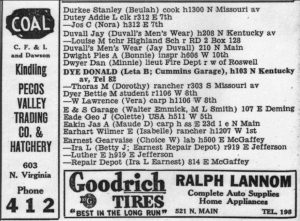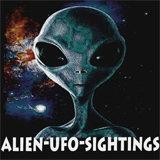Roswell Reflections: Frankie Rowe and the Roswell Fireman
I grow tired of having to repeat the same information over and over because the skeptics and the debunkers simply don’t want to hear it. Now I’m back defending Frankie Rowe (seen here) who has been called a liar for no reason that I can understand. She might be mistaken. She might be wrong. But she is relating the information to us as best she can.
Recently, on a skeptics forum, someone wrote about Rowe asking if it wasn’t true that it had been proven that her father had not been with the Roswell Fire Department. No, it’s not true and unless you can source your information, just keep it to yourself. This is just like the news media saying, “According to published reports,” without saying where those reports were published.
I can say that according to published reports, Bill Clinton, while president, had meetings with alien creatures. Of course the report was published in the Weekly World News which was making it up, but it was a published report.
Saying the source is a published report tells us nothing about the veracity of that report, but hey, it sounds good.
Had the skeptic wanted to know the truth rather than just hurl an accusation, he, or she, could have called the Roswell Fire Department and asked them. Or called the Roswell Library and have them look it up in the Roswell City Directory of 1947.

I have a copy of that Roswell City Directory and it lists Dan Dwyer, Frankie’s father, as a lieutenant in the fire department and I have copies of the fire logs from June and July 1947 and find his name in there frequently. There is no question that Dan Dwyer was a member of the Roswell Fire Department in July 1947. On one page, we see that Dan was the officer in charge six times. On another page from late May through June 24, we see Dwyer or Dan as the officer in charge ten times.
But we can take this further right now. Skeptics have complained that Frankie’s story is stand alone, meaning that no one has corroborated it. Well, her sister, Helen Cahill, did tell me that she had heard the story of the crash and the threats made against her in the early 1960s. The story was not as robust as that told by Frankie and can be explained by the simple fact that in 1947 Helen was already married and living away from home.
Cahill also said that sometime in 1948, during a visit with her parents, her father (Dwyer) told her that something important had happened, but he couldn’t tell her because he was concerned about the safety of the family. Her mother, Minnie, said that Cahill’s father could tell her about it, but he was afraid that something would happen to her, Cahill, if he did. And yes, I have the signed, notarized statements in my files.
But now the story takes another turn. Karl Pflock rejected Rowe’s story because he’d talked to three former fire fighters who claimed no knowledge of these events and that the Roswell Fire Department didn’t make runs outside the city limits in 1947. He knew this because Max Littell, who had been a member of the city counsel in the early 1950s told him so.
On June 21, 1947, according to the fire log, Pumper No. 4 made a run “out side city limit.” So, it is quite clear that Frankie’s father, Dan Dwyer was a lieutenant in the Roswell Fire Department as the documentation shows. It is quite clear that the fire department did make runs outside the city limits. Maybe the next time the skeptics will take a moment, use the Internet and find out if the allegations are warranted.
Now, let’s talk about the new corroboration for Frankie… Tony Bragalia and I have been in contact with a former member of the Roswell Fire Department (and no, I’m not going to publish his name but if Christopher Allen would like it, I’ll email it to him for verification purposes — he is very old, a bit cranky and doesn’t need several dozen telephone calls). This man was interviewed by Pflock and Pflock cited him as saying the Roswell Fire Department didn’t make a run outside the city to the crash site.
For Pflock, this disproved Frankie’s story. And the man told us the same thing. The fire department didn’t make a run to the crash site. But then the retired fire fighter said something else. He told us that a colonel had come out from the base and told them not to go out there. That they, the military, would handle it.
I believe that Karl Pflock was an intellectually honest researcher who would have reported everything he learned rather than leaving out a critical piece of information like this, if he heard it. Once he was told that the fire department hadn’t made the run outside the city and that there was no documentation for the run, he stopped asking questions. He had what he wanted.
But I asked the retired fire fighter if he knew Dwyer and learned that he did (another corroboration for Frankie Rowe). I asked about Dwyer making a run outside the city and that was when I learned of the “colonel” who had advised against it. I was told that they didn’t make the run.
And then I was told that Dwyer, in his personal car did drive out to the crash site. Dwyer and not the fire department, which explains why there is no record of it and why other fire fighters didn’t remember it.
The retired fire fighter was quite clear about these points. They had been visited by an officer from the base, they had been told not to go out there, and Dwyer, in his personal car, did.
Does this prove the story to be true? Of course not. But it does prove that Frankie Rowe hasn’t been lying. She was telling us exactly what her father told her, what he had told her sister and what he had told his friend in the Roswell Fire Department.
It undermines some of what Karl published in his book because we were using the same sources and it is clear to me that Karl just didn’t ask the right questions to find out what happened. He only asked those that verified what he believed and asked no others. Sometimes asking the next question reveals information that you don’t want to hear. Trial attorneys are well versed in not asking certain questions.
Oh, one final thing. I do have the interview on tape… Tape solves many problems. When someone says I misquoted him or her, I can play the tapes. When someone challenges what I have written, I can play the tapes. More than once I have proven my point with those tapes. And here I can prove that this fire fighter said to me and said to Tony, just what I said that he did.
